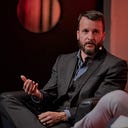Member-only story
Teaching ‘Epistemology’ to design students using Abbott & Costello
I have addressed in past posts and articles that in order to perform design as a process, one might be able to get away without thinking philosophically and focus on following the methods in order to accomplish some design outcome. However, this usually fails… or when the designer does hit a barrier (mental, sociological or institutional), they are stuck at “Why-centric” questions that simply are un-answerable using ‘what-how’ considerations. This, folks, is why we need to use design philosophy in order to address the deeper questions that design focuses on- innovation, change, disruption, critical reflection, experimentation and employing the artistry plus the science to fuse them into something beyond what either accomplishes independently.
“Wait a second,” many might say as we try to introduce design philosophy into the mix. “We need to keep it simple, stupid.” Or, a myriad of other tropes that in defense and security fields we tend to hear after ramping down from one conflict period or another. “Get back to the basics”, “purge us of those Ivory Tower thinkers and navel-gazers… so we can do what we are best at!” Or, one of my favorite groups of institutional defenders are those that defend military doctrine as “the most good-enough solution we have for this imperfect world… you just need to follow the doctrine more closely and…
